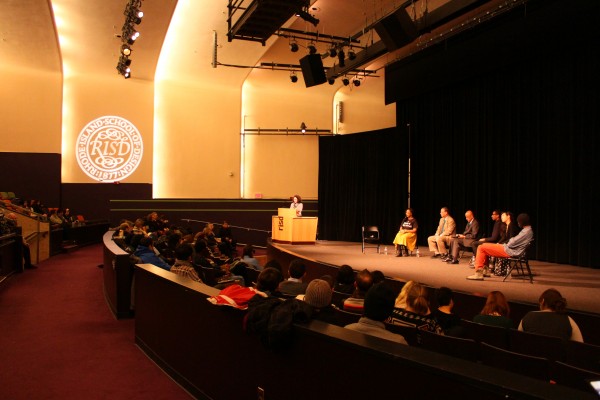
Earlier this month more than 100 RISD students and community members gathered at the Canal St. Auditorium for a panel discussion on institutional racism and police violence.
The panelists represented a variety of local organizations. The Providence NAACP was represented by chapter president James Vincent. Panelists (and RISD alumnus) Jess X Chen and Jonathan Key co-founded the Artists Against Police Violence collective. Steven Roberts (a RIC alumnus) helped to create End Police Brutality PVD (which organized the Nov. 25th #IndictAmerica and the Dec. 5th #ThisEndsToday marches). Finally, Yelitsa Jean-Charles (a student) and Normand Gamache (director of public safety) represented RISD.
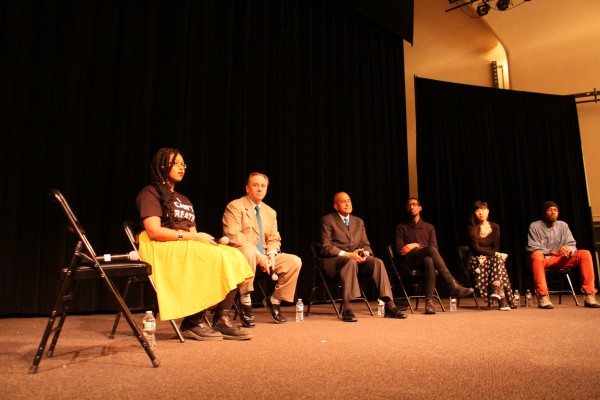
Opening Remarks were presented by RISD Director of Residential Life Kevin Forti and RISD President Rosanne Somerson. Forti’s introduction provided a brief history of Black and White race relations in America, connecting the killings (and subsequent non-indictments) of Michael Brown and Eric Garner with the advances and setbacks faced by the Black community following the end of the Civil Rights movement. Forti contrasted the election of President Barack Obama with Florida’s controversial “Stand Your Ground” laws, the repeal of sections of the Voting Rights Act, and the pronounced economic inequality resulting in high rates of poverty and unemployment in the Black community.
President Somerson recognized the historical importance of artists in defining revolutions and movements. She recognized that visual art has the capability to express concepts that may be difficult to articulate otherwise. Somerson’s remarks reminded the audience that RISD values social justice, and implored the audience to be proactive agents of change.
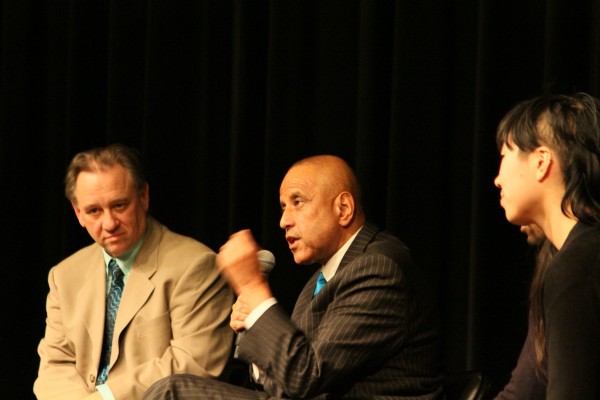
The panel discussion began by relating key issues specific to the Ferguson case with larger social trends. Providence NAACP chapter president James Vincent was the first to answer, describing the racial disparity between the Black community and a mostly White police force. Michael Brown’s representation as a “thug” was used to justify the use of lethal force against an unarmed man. The use of “thug” to describe Brown is particularly dangerous, as it is based upon racial profiling of Black men as dangerous, and is used to justify officer-involved shootings of unarmed suspects. Normand Gamache drew upon his experience in law enforcement to state that the Ferguson police department was not acting properly as it failed to properly engage the community.
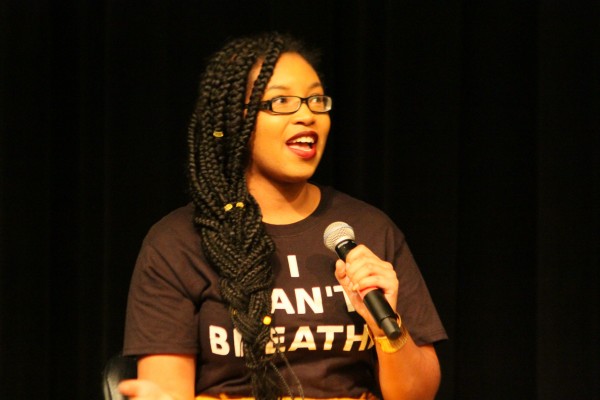
Yelitsa Jean-Charles described the lack of accountability for police departments. Part of the lack of accountability includes recognition of implicit biases, which are split-second, subconscious judgments made without conscious input. Implicit racial bias, historically measured by a race-specific version of the Implicit Association Test (IAT), could explain the increased rate of officer-involved shootings of unarmed Black victims. Administration of the IAT to officers could gather more information on implicit biases present in the active duty police force.
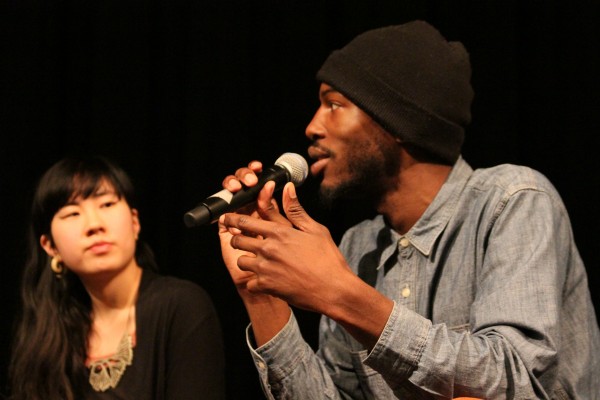
Finally, Steven Roberts described the historical role of police forces in anti-Black violence. Roberts mentioned the Fugitive Slave Act of 1850, which required law enforcement officers across the country to re-capture anyone suspected of being a slave. Captured individuals would be returned to the alleged owner without a jury trial, with a sworn statement of ownership being sufficient proof in some cases. Officers were legally obligated to return any suspected fugitive slaves, setting the ground for a system of racial profiling by law enforcement officers.
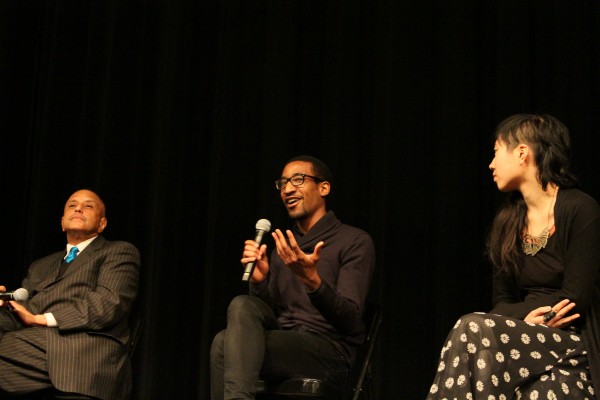
The next set of questions related the topics of institutional racism to the art world, and RISD students’ future role as image-makers. Key and Chen both described the problems they encountered as artists of color. Chen described the difficulties showing works in a White-dominated environment – the majority of her peers could not relate to the experiences that the piece described, and she did not feel comfortable sharing in this environment. Key described how artwork from the perspective of people of color, or artwork that addressed White supremacy was not taken seriously. White art directors would ask him if he could do art that “wasn’t about race”, which devalued his voice as a Black artist.
]]>
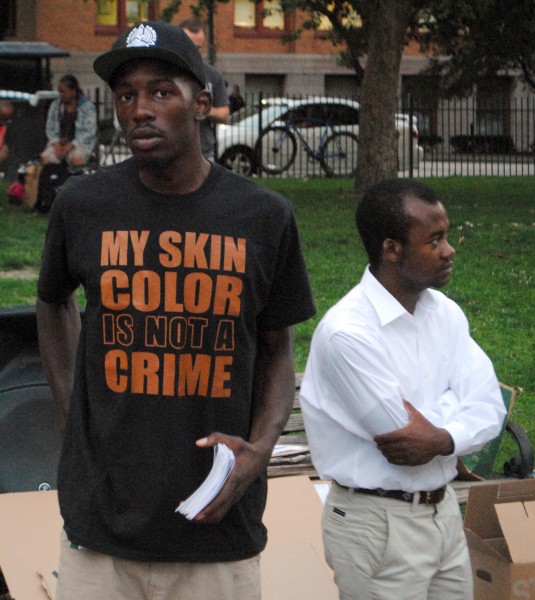 “I want to speak on respectability politics,” said one of the speakers at the #HowManyMore rally held in Burnside Park last night.
“I want to speak on respectability politics,” said one of the speakers at the #HowManyMore rally held in Burnside Park last night.
“Which,” he continued, “is basically telling a black or brown poor kid to pull our pants up, turn our hats the right way, wear a suit and we’ll get ahead, Alright? Fuck that, alright? Martin Luther King had a suit and tie on when he was shot. Malcolm X had a suit and tie on when he was shot. Medgar Evers had a suit and tie on when he was shot. This is my suit and tie. This is the uniform of the hip-hop generation, my sagged pants and my cocked hat.”
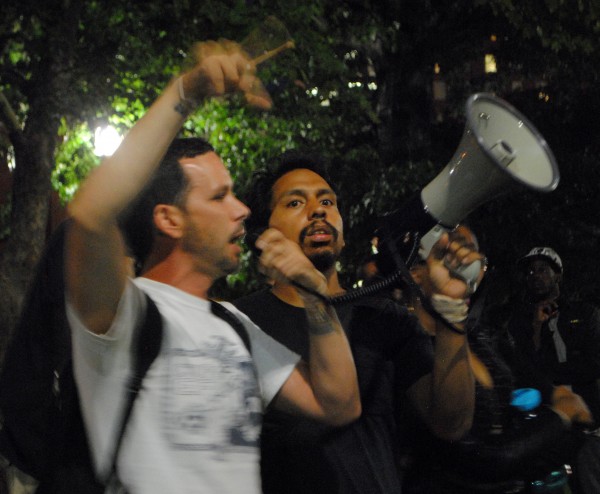 The event was billed as an event to “Demand justice for all victims of anti-black violence, state terror and police impunity.” Many of the over 120 people present, especially people of color, had stories to tell of being stopped by the police and being treated as criminals because they “fit the description. The event was held under the watchful eye of the Providence Police, who hovered at the edge of the park. Ironically, just as Alex, one of the event organizers, took the microphone to address the crowd, the police swooped in on the other side of the fountain to arrest a homeless man for reasons unknown.
The event was billed as an event to “Demand justice for all victims of anti-black violence, state terror and police impunity.” Many of the over 120 people present, especially people of color, had stories to tell of being stopped by the police and being treated as criminals because they “fit the description. The event was held under the watchful eye of the Providence Police, who hovered at the edge of the park. Ironically, just as Alex, one of the event organizers, took the microphone to address the crowd, the police swooped in on the other side of the fountain to arrest a homeless man for reasons unknown.
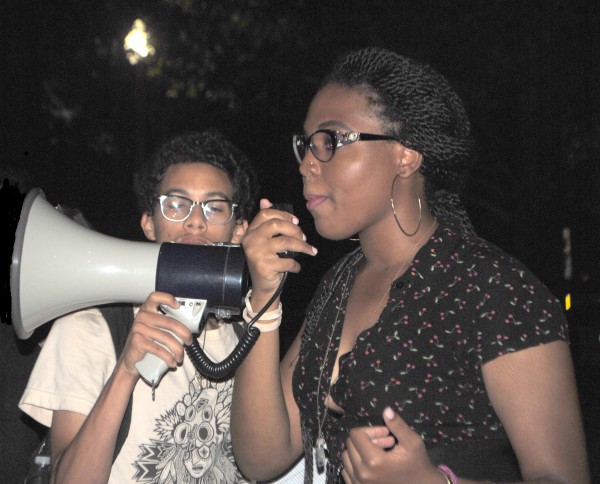 “I think it’s really important to understand that police violence, anti-blackness and white supremacy all plays out in our society in a variety of ways,” said Andrea, one of the organizers, “Some of this violence is actually physical violence that leads to death, that leads to imprisonment, etc., but some violence is not so physical. We can have emotional violence, we can have spiritual violence, and that’s constantly happening to us…”
“I think it’s really important to understand that police violence, anti-blackness and white supremacy all plays out in our society in a variety of ways,” said Andrea, one of the organizers, “Some of this violence is actually physical violence that leads to death, that leads to imprisonment, etc., but some violence is not so physical. We can have emotional violence, we can have spiritual violence, and that’s constantly happening to us…”
The killing of Mike Brown, an unarmed black man in Ferguson MS, has sent reverberations throughout our country, and young people, like those who held this rally, are beginning to explore ways in which to stand up against racial profiling, police militarization and the corporatization of law enforcement, including the prison-industrial complex.
The conversation is shifting.
Watching citizens and activists peacefully organize around the ideas of inclusivity and respect for human rights fills me with hope for the future.
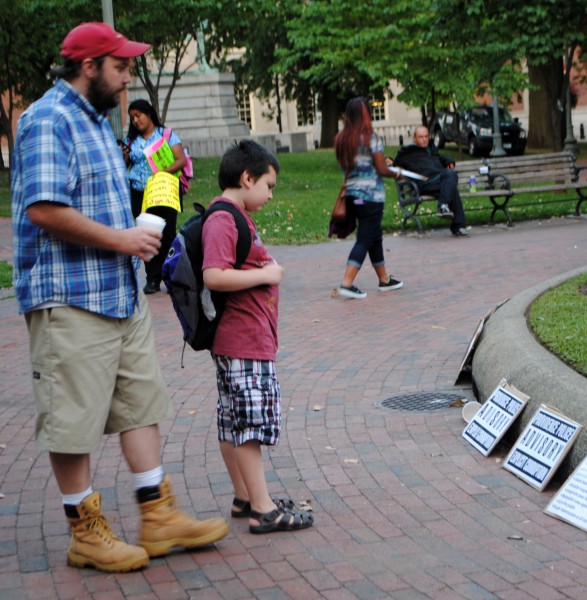
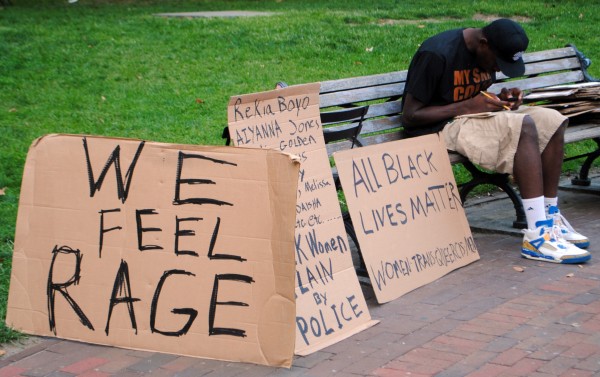
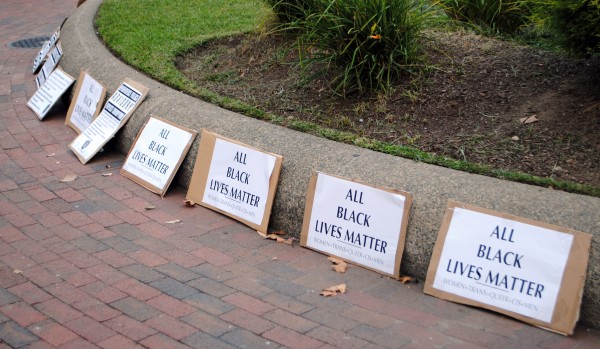
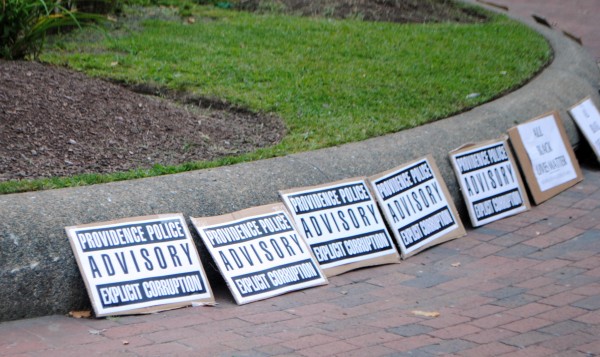

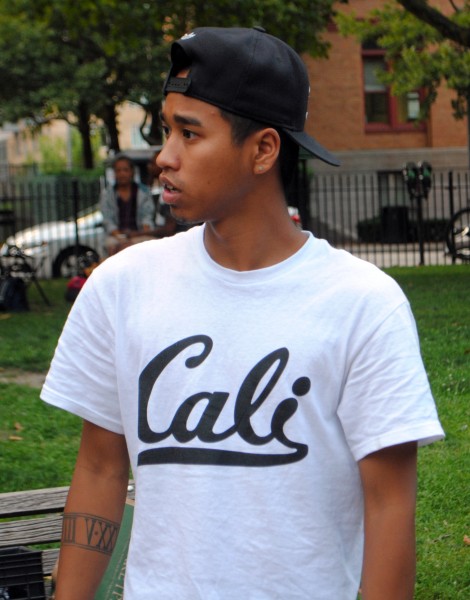
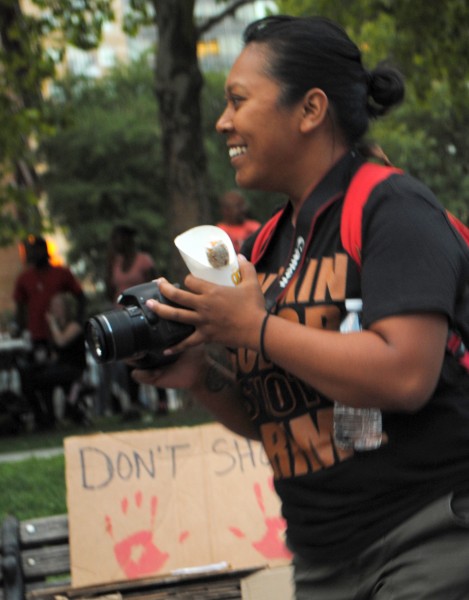
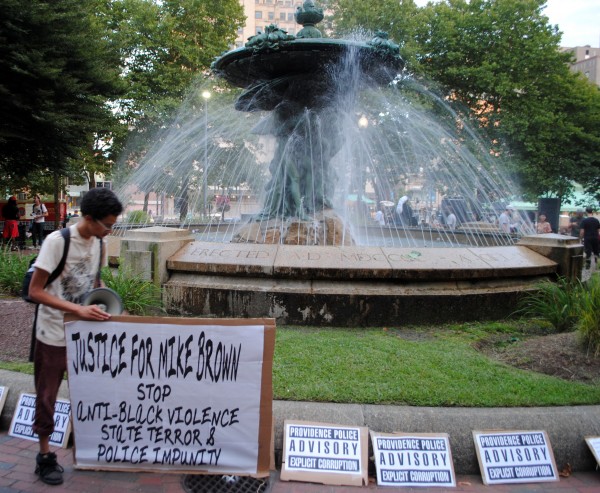
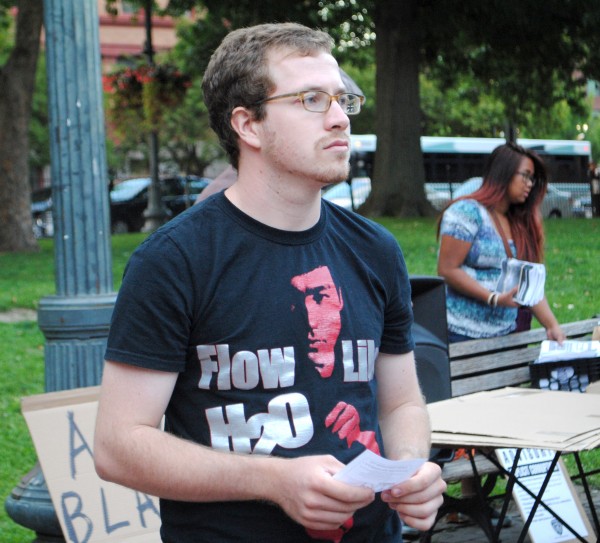
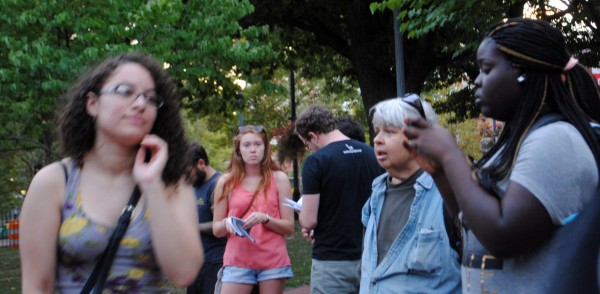
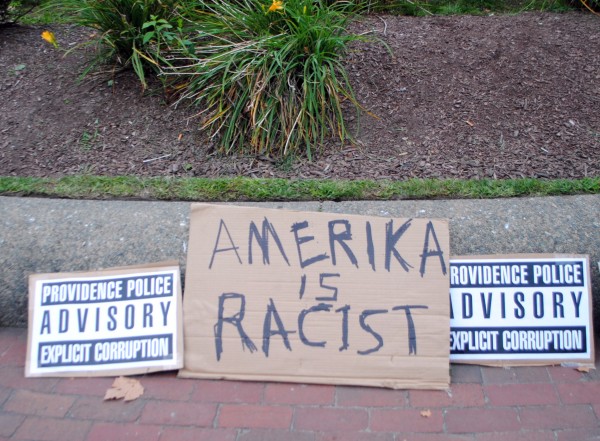
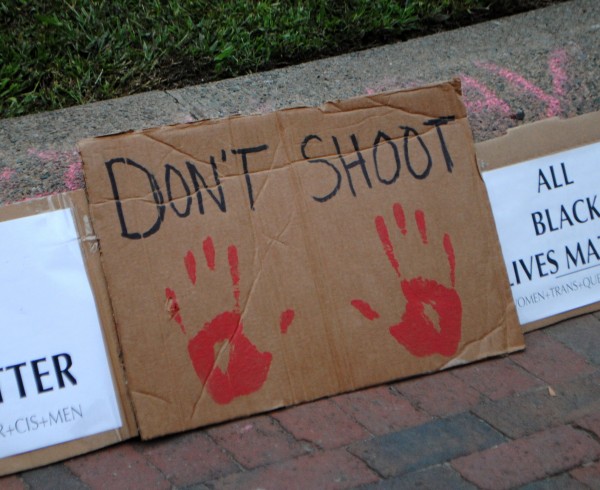
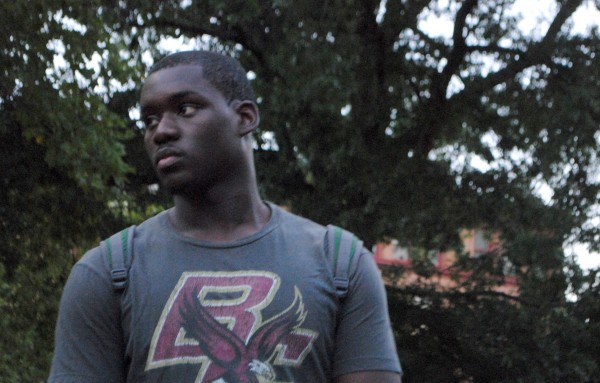
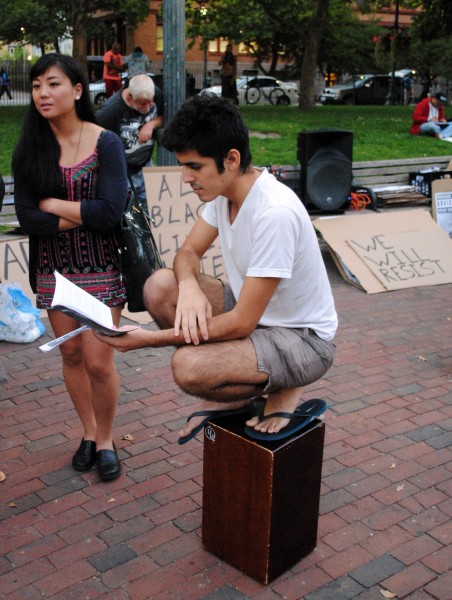
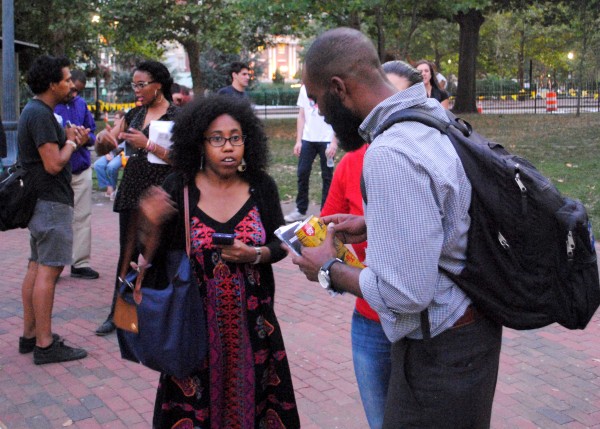
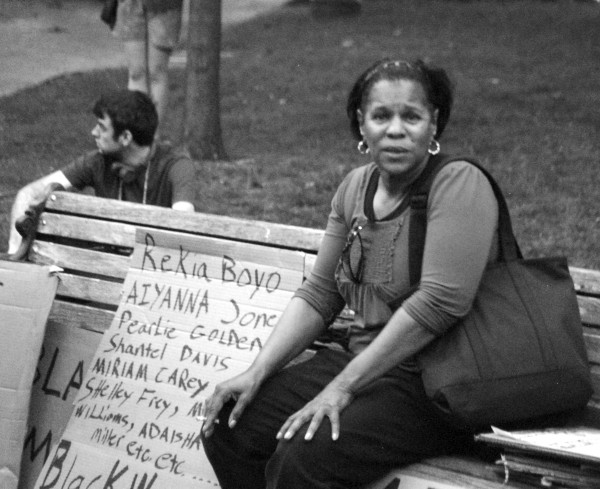
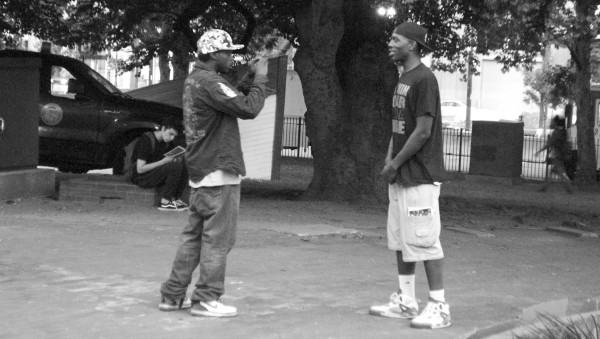
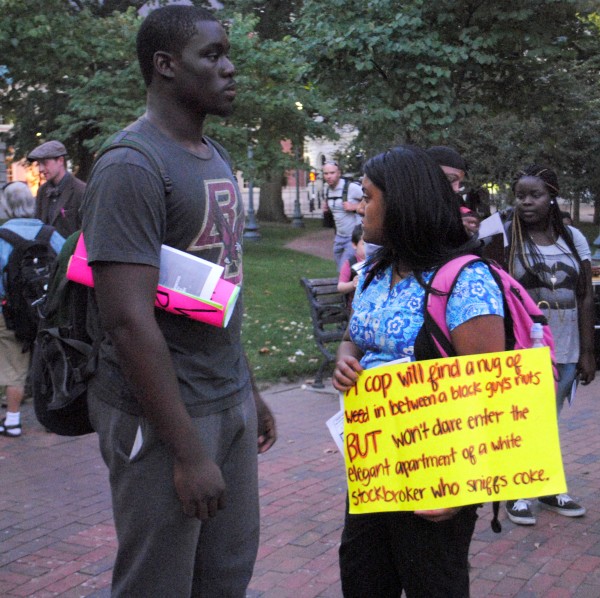
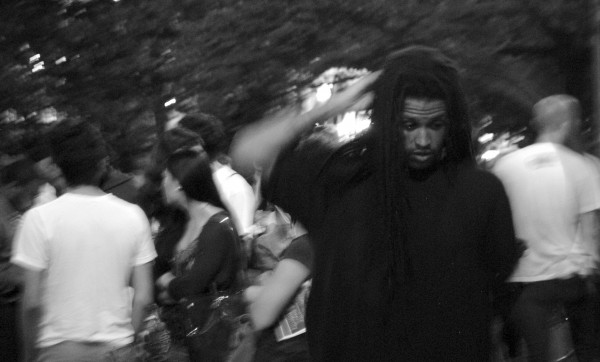
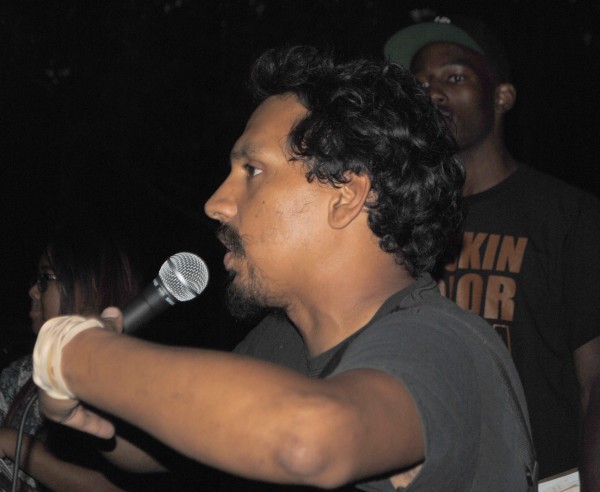
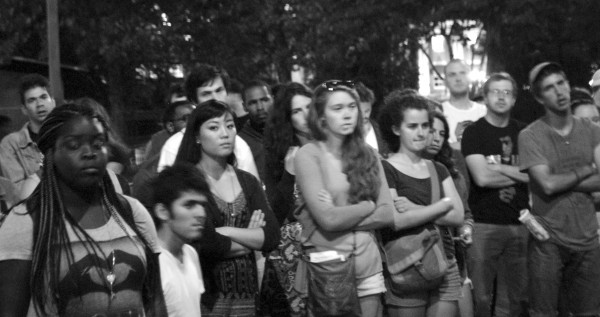
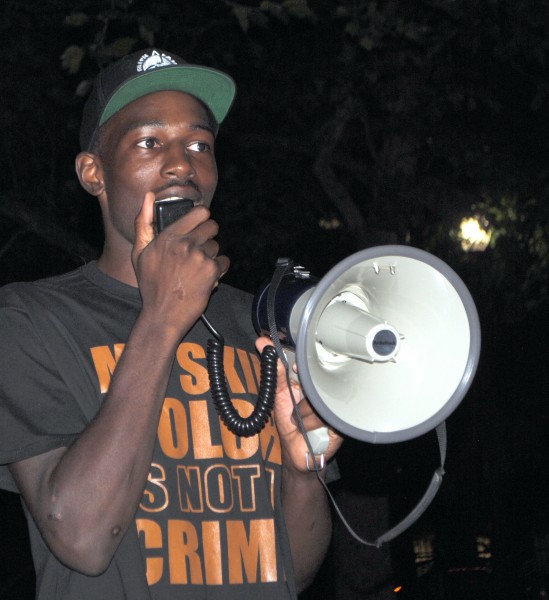
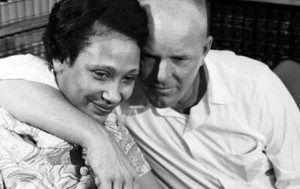 As the struggle for marriage equality in Rhode Island continues, and as the state Coalition Against Racial Profiling prepares for the reintroduction next week of its anti-racial profiling bill, the story of Mildred and Richard Loving is more timely than ever.
As the struggle for marriage equality in Rhode Island continues, and as the state Coalition Against Racial Profiling prepares for the reintroduction next week of its anti-racial profiling bill, the story of Mildred and Richard Loving is more timely than ever.
You can come watch the movie with the Rhode Island chapter of the ACLU Monday at 6:00 PM, in the RIC Student Union Ballroom. You can also watch the trailer here:
The Lovings were an interracial couple arrested for miscegenation in 1958 and exiled from Virginia. With the help of the ACLU, they took their case to the U.S. Supreme Court, which in 1967 – finally — struck down these discriminatory laws across the nation.
Last September, the RI ACLU hosted a packed screening of “The Loving Story,” an award-winning HBO documentary about the case, at the Cable Car. On Monday, to kick off African-American history month, the ACLU and the Unity Center at Rhode Island College are planning to hold another free screening of this film at RIC to which the public is invited.
Tracing the history of the case, the film provides a compelling parallel to the contemporary issue of marriage equality, while also documenting the deep-seated nature of racial discrimination that still permeates our society.
We encourage you to attend, as it can only fuel the sense of urgency behind having 2013 finally be the year that the Rhode Island legislature both approves marriage equality for same-sex couples and enacts measures designed to reduce the unconscionable level of racial profiling that still exists on the streets and highways of Rhode Island.
]]>
So, when the Trayvon Martin slaying entered the national consciousness, it became clear to most that a single person acting alone had killed a harmless youth and not faced any penalties for it. The youth’s crime? Being black, mainly; although his killer, George Zimmerman, claims he looked drunk.
Obviously, this set-off a whole host of people to debate the events of the night, and names like Emmett Till were tossed around. Some have focused on Florida’s “stand your ground” law, which allows someone to utilize self-defense to justify a killing even if they didn’t make an attempt to flee from their assailant. So, it appears to me that a single man, with a history of bad judgement calls, killed a teenager for no reason other than his suspicions.
But you know what, there was a possibility I hadn’t considered. Trayvon Martin was wearing a hooded sweatshirt. And Geraldo Rivera thinks this was as much a cause of his death as anything else. Now, this started creeping into territory that gets me a little scared. See, I’ve been to Britain, and in Britain, Mr. Rivera’s remarks would not be that far off from what people are willing to think. See, in Britain, the hooded sweatshirt has been transformed from an unobjectionable piece of clothing to the dreaded “hoodie” bringer of riots, crime, and destruction. I don’t know where along the way “hooded sweatshirt” became reduced to “hoodie” but I think that reduction could possibly be part of the problem. A hooded sweatshirt is just a sweatshirt with a bit of cloth to keep your head warm. A hoodie is a whole style of clothing. I actually think I grew up without distinguishing between a regular sweatshirt and a hooded sweatshirt when speaking.

It’s gotten so bad that a six-year old was actually banned from a supermarket for wearing a hooded sweatshirt that had been bought from said supermarket. That’s where Britain’s paranoia has brought it. They also rely on the famous “Anti-Social Behaviour Order“, labeling a whole generation “ASBOs” in slang for such innocuous activities as “loitering” or “spitting”. Luckily, ASBOs may be going away.
Fear of the hooded sweatshirt may not. Mr. Rivera is right in that it’s a pretty useful garment in avoiding a camera. But does that mean we go about stigmatizing what is a really comfortable and useful piece of clothing simply because of a few bad apples? It’s like banning cars because they kill people. Or because they’re used in crimes. At the end of the day, it shouldn’t matter what type of clothing you wear; whether you’re white or black, whether you’re Latino or Asian. You have the right to walk to the corner store and not be killed.
]]>The book, “The New Jim Crow: Mass Incarceration in the Age of Color Blindness,” is about the disproportionately high number of young black people who turn to crime and how society has failed to address this issue. According to the book’s website
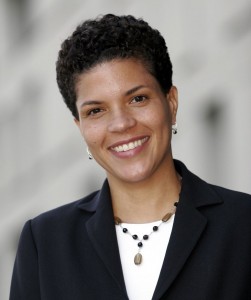
:
“The New Jim Crow is a stunning account of the rebirth of a caste-like system in the United States, one that has resulted in millions of African Americans locked behind bars and then relegated to a permanent second-class status—denied the very rights supposedly won in the Civil Rights Movement.
“As the United States celebrates its ‘triumph over race’ with the election of Barack Obama, the majority of black men in major urban areas are under correctional control or saddled with criminal records for life. Jim Crow laws were wiped off the books decades ago, but today an extraordinary percentage of the African American community is warehoused in prisons or trapped in a parallel social universe, denied basic civil and human rights…”
According to Brown, “Alexander is widely know for her work advocating for civil rights. In recent years, she has taught at a number of universities, including Stanford Law School, where she was an associate professor of law and directed the Civil Rights Clinics. In 2005, she was awarded a Soros Justice Fellowship, and that same year she accepted a joint appointment at the Kirwan Institute for the Study of Race and Ethnicity and the Moritz College of Law at The Ohio State University.”
She’ll be signing her book after her lecture.
]]>The antebellum era south, unfettered by the U.S. Constitution, through its slave system and social codes securely presided over the lives of African people. The notion of a Black political voice existed only in the minds of those enslaved, emancipated, and escaped who determined to imagine political freedom within the nation. Conceding that the scale of plantation slavery in northern locales was moderate by comparison to the south, the white political control was no less thorough. Indeed, prominent New England families like the Browns and De Wolf’s, both from Rhode Island, were elite financiers in the transatlantic trade in human beings. Because money and politics always go together in an American political rubric, access to the ballot stands as both a gateway and barrier. During the lead up to the Civil War political elites in states like Rhode Island and New York effectively negated any designs black males had on the franchise:
In 1822 Rhode Island denied that black men were eligible to vote in its elections . . . In New York an 1821 state constitutional convention raised the property qualification for black voters while eliminating it for white voters. This denied the right to vote to nearly all of the ten thousand black men who had previously voted in the state.[1]
An 1838 political convention in Pennsylvania sketched out modifications to the state’s constitution which secured the enfranchisement of “all white males and disfranchised all black males.”[2] Discontent with this repressive maneuver, black Pennsylvanians for the next two decades sought to have it overturned as they “petitioned Congress to help them gain equal access to the polls. But their efforts failed.”[3]
After the Civil War three Reconstruction Amendments to the U.S. Constitution were ratified. The Thirteenth, Fourteenth, and Fifteenth emerge out of a particular moment in which ruling class elites are forced to host a conversation on the sociopolitical status of those once kept as line items on asset statements. New civic, social and political definitions would be required to Constitutionally (re)classify the formerly enslaved.
If Blacks were no longer property then were they somehow humans? If they were humans living among whites within the nascent State then were they citizens also? If they were citizens without the Constitutionally protected right of suffrage then what does citizenship mean? These were among the most important questions the U.S. government had to take up.
The thought that Blacks would be franchised and economically empowered congruent with white, propertied, and literate males was anathema to the Eurocentric ruling class establishment. What followed was a myriad of social, political, and outright violent measures designed to not only prevent Black males from voting but render them less inclined to even try. By now we all know the historical constellation erected to frustrate Black’s attempts at voting: literacy tests, the grandfather clause, poll taxes, voter intimidation and coercion, property qualifications, etc.
Today, blatant attempts to violate the Fifteenth and Nineteenth Amendments where People of Color are concerned would almost certainly be universally decried. With the election of Barack Obama this current episode of African American voter disfranchisement was obliged to revise its pro-American political diction. It needed to appear as though it was protecting the sanctity of the constitutional right of the very people it would ultimately assail. Enter the Republicans.
In 2010 Congress saw a majority of Republicans take state house seats nation wide. That single election cycle increased by twelve the number of states with Republican majorities in their legislatures. One of their first collective political initiatives ensured that the exercise of the Fifteenth and Nineteenth Amendments would be measurably more difficult where voters of Color were concerned. With but a single exception Republicans introduced rigid voter ID bills which carried with them the effect of disfranchising significant numbers of Black and Latino voters and thereby negating important gains achieved after over a century of political struggle.
A recently release report by the Brennan Center for Justice titled Voting Law Changes in 2012 states that “Legislatures introduced and passed a record number of bills restricting the access to voting this year.” Republican advocates of the new laws have routinely argued that the passage of the legislation would significantly eliminate voter fraud. Aside from the fact that voter fraud nation wide has been at inconsequentially low levels, Democratic objections, according to the Brennan report, emphasize that,
. . . the new laws will make it much more difficult for eligible citizens to vote and to ensure that their votes are counted. In particular, they have pointed out that many of these laws will disproportionately impact low-income and minority citizens, renters, and students — eligible voters who already face the biggest hurdles to voting.
The report goes on to mention that nationally, eleven percent of all registered voters possess no photo ID. But even more significant percentages of minority voters, young and senior citizens alike, lack either state or college issued photo IDs. In some instances state legislatures have moved to actually eliminate legal provisions that once allowed student photo IDs as a legitimate form of identification. And it is precisely this minority population that Republican lawmakers have targeted in order to reduce voter turnout because they vote heavily the Democratic ticket.
If Democratic Representative John Lewis has said that “this year’s Republican-backed wave of voting restrictions has demonstrated that the fundamental right to vote is still subject to partisan manipulation.”[4] Marcia Fudge, a Congresswoman from Ohio voices it more directly: “these efforts have and all-too familiar stench of the Jim Crow era.”[5]
For example, in Colorado the new Republican Secretary of State, Scott Gessler, ordered that “inactive” (though registered) voters in predominantly Democratic districts not be mailed ballots even though they normally receive them — potentially disenfranchising nearly 73,000 registered voters in just two Colorado counties alone. Denver and Pueblo County Clerks Debra Johnson and Gilbert Ortiz have vowed to mail the ballots anyway, in defiance of Gessler. “The City and County of Denver has consistently provided all eligible voters with ease of access to the voting franchise and we plan to continue to do so . . .” said Johnson, preferring to battle Gessler in court, if necessary.
Republican controlled legislatures in no less than seven states have also moved to place strict, if not effectively inhibiting, regulations on organizations which coordinate voter registration drives. The Brennan report mentions that in one Florida county the League of Women Voters along with other voter registration organizations accounted for 62.7% of new voter registrants. Increases in African American voter participation have historically been the direct result of community-based voter registration drives. “African-American and Hispanic citizens in Florida are more than twice as likely to register to vote through such drives as white voters” cites the report.
Moreover, both Florida and Ohio have critically curbed early voting on Sundays (Ohio has eliminated it outright). Clearly, this political scheme is directed at African American citizens who, in disproportion to their white counterparts, tend to head to the ballot box on Sundays after church and when they are less likely to be at work or in school.
These are but a few examples of what amounts to African American voter suppression in an Obamasonian “colorblind” era. Like the malevolent poll taxes and literacy test of old, these forms of political management by the Republican establishment function as proxies for Jim Crow style racial management. Our political enemy has spoken. How will we respond?
Endnotes:
[1]Hine, Darlene Clark, William C. Hine, and Stanley Harrold. African Americans: a concise history. Alexandria, VA: Prentice Hall, 2004.
[2-3] Ibid.
[4-5] Brennan Voting Law Changes Report